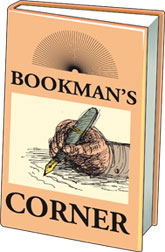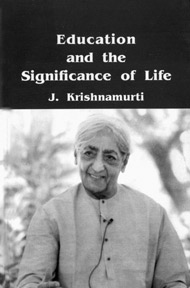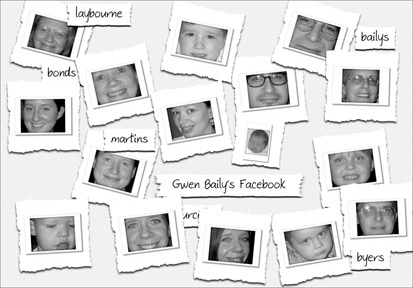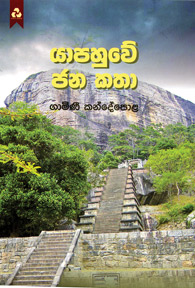|

Not your regular philosopher
Reviewed by R. S. Karunaratne
Jiddu Krishnamurti is a modern-day Indian philosopher whose ideas
have an everlasting value to all those who can think for themselves. In
his discourses and writings Krishnamurti has challenged our age-old
ideas vehemently. The book under review consists of eight essays on
education and the significance of life, the right kind of education,
intellect, authority and world peace, the school, parents and teachers,
sex and marriage, and art, beauty, and creation.
Krishnamurti had an abiding interest in education and life.
“Education and the significance of life” is one of the earliest and most
expository books on the subject. He focuses on the central theme that
life has a wider vision and deeper significance.
 |
|
Education and the significance of life
Author: J. Krishnamurti
Published by Krishnamurti Foundation, India
Available at Krishnamurti Centre, Sri Lanka Inc. |
He believes that it is the concern of educators to explore various
other connected themes such as freedom, discipline, intelligence, the
nature of creation, and the role of religion in education. He stresses
that an environment free of fear is essential for creating an atmosphere
in which real education can take place.
According to Krishnamurti human beings in the world are similar in
nature. Whether they live in Sri Lanka, Bangladesh or the United States
of America, their chief aim is to find greater security, creature
comforts and trouble free life. This is due to conventional education
they are exposed to. However much a person is educated, he is unable to
make independent decisions. As a result, he becomes a mediocre person.
When such a person becomes old, he will inherit only wrinkles on his
body and dullness of mind.
Despite this common trend in society, a few men try to examine human
problems objectively. Some of them revolt against the established
orthodoxies only to fall into new orthodoxies. In most countries such as
France, and Russia, revolutions led to illusions. After breaking away
from one group, people were forced to join another. Krishnamurti calls
this a kind of reaction but not a real revolution of the mind.
The present education leads people to develop certain faculties. For
instance, by following a course in law, you can become a lawyer.
Similarly, universities keep on producing doctors and engineers.
However, education should have a wider significance to life. Without
integration of what we learn, life is going to be full of conflicts and
problems. For instance, if a lawyer drags on his cases to earn more, he
is not a good lawyer. Similarly, if a doctor does not cure a patient
during a reasonable time, his education is questionable. What is more,
if a nuclear scientist invents a powerful bomb to destroy the whole
world, he is not worthy of being called a scientist.
Krishnamurti does not mince his words when he says, “Our present
education is geared to industrialization and war, its principal aim
being to develop efficiency; and we are caught in this machine of
ruthless destruction. If education leads to war, if it teaches us to
destroy or be destroyed, has it not utterly failed?”
Then what is the purpose of education? According to him, if we can
understand ourselves, that is the beginning and the end of education.
This is not something easy. Try to answer the seemingly naive question:
“Who am I?” You will never be able to answer this question correctly
unless you have understood yourself. Without such an understanding of
yourself, you will not be able to understand the world or its problems.
What goes on in the name of education is learning a few phrases of a
subject, sitting an examination, writing a thesis and receiving a
certificate at a ceremonial function. Real education should help us to
break down our national and social barriers instead of reinforcing them.
Krishnamurti says that both governments and organized religions try
to control education because they want efficient men and women but not
real human beings who can think for themselves. What is tragic is that
the world is short of such thinkers or integrated human beings.
Discipline is a part of modern education. Instead of understanding a
child, we try to discipline him. This is the easiest way to get out of a
problem. It will take a longer time to understand the child.
Krishnamurti categorically says that discipline becomes a substitute for
love and it is because our hearts are empty that we cling to discipline.
In the last chapter he deals with art, beauty and creation. According
to him art offers a respectable and easy means of escaping from
ourselves. Art divorced from life has no significance. On the other
hand, even the love of beauty springs from the desire for security. Such
a desire creates fear. What is more, even the most beautiful painting
will lose its appeal after some time.
Great authors, poets and artists are creators. We read their books,
poems and view their paintings without experiencing the sublime
feelings. All the time we are looking for methods to organize our lives.
If we do not have such a method, we feel utterly lost. Creativeness
comes into play when there is constant awareness of the ways of the
mind.
“Education and the significance of life” explains Krishnamurti’s
philosophy on the subject. His views, as usual, are ahead of his time
and some of us may not understand their significance easily. In order to
understand Krishnamurti’s philosophy the book provides us with an
opportunity. What is fascinating is that Krishnamurti is not the regular
philosopher you may come across in your reading.
Thought provoking novel about an abandoned child
Sunil The Struggling
Student
Author: Dr. Susunaga
Weeraperuma
Publishers: AFAQ, 479,
Unite 4 Daoudiate,
Marrakech, Morrocco
by Andrew Scott
This thought provoking novel tells the story of Sunil, a Sri Lankan
adolescent. It traces his development from a poverty stricken boy to the
successful founder of a world wide anti-war campaign to save humanity
from the path of death and destruction. The novel is written from the
standpoint of an elder Sunil who reviews his years as a schoolboy and
student.
Being by nature a keen observer of society, Sunil experiences quite
early in life the barriers that separate man from his fellowmen - skim
colour, money, education and occupation. Sunil is socially disadvantaged
because he is dark complexioned and comes from a poor family. His mother
works as a cleaner. Soon this bold spirited boy sees the meaninglessness
of these barriers, which do not result in good behaviour and personal
fulfilment. Although his mother is poor and illiterate Sunil perceives
that she has a nobler mind than many a wealthy and educated person.
Sunil’s mother is one of the most amiable characters of this novel,
being selfless, charmingly naive and content with her lot. When Sunil
turns 14, his parents disclose to him that he had been a foundling. The
revelation of Sunil’s adoption does not affect the emotional bond
between him and the couple who raised him.
The most crucial event in Sunil’s life is the tragic death of his
parents in a terrorist attack. Sunil is suddenly homeless and destitute.
His life changes dramatically when Kelaart, a wealthy and eccentric
Burgher gentleman, takes pity on the boy on the streets and invites him
to his posh residence next to the University of Peradeniya.
While Sunil is studying for a bachelor’s degree Kelaart spends his
time writing a book - The Trials and Tribulations of Being Gay’. Their
friendship is based purely on affection, but their out-look on life is
quite different. Despite their differences Kelaart very generously
finances Sunil’s education, gives him material security and bequeaths
his fortune to this parentless boy.
Sunil cultivates a friendship of a fellow female student, Menika,
whose aunt has him as a boarder. He obtains his bachelor’s degree but
exists on the money sent by Kelaart. Sunil starts a movement for peace
and his friends Kelaart, Menika and her aunt supports his campaign for
peace named AWAKE which stands for Abolish War and Killing Enemies.
Sunil makes a strong case that the military should become farmers and
soon he becomes a world renowned personality. The logo of AWAKE is the
dove which gracefully flaps its wings and flies clear of the dark
clouds. As it gracefully moves this beautiful bird warms against war and
flies clear of the dark clouds and as it moves from continent to
continent it sings the song of peace.
The writer of this novel, Dr. Susunaga Weeraperuma, is an experienced
writer on a wide range of subjects, specially on the philosophy of
Buddhism, and has already published more than 30 widely read books. Born
in Sri Lanka he has spent a major part of his life in the U.K.
Australia, Switzerland and France, where he is living now. His writings
have been widely acclaimed by both scholars and laymen throughout the
world. This prolific writer now lives in France and devotes his time to
writing, organic gardening and practising yoga.
Sunil The Struggling Student is a meticulously brought out novel
which should easily find a place among all good works of literature. The
value of the book to the reading public is enhanced very much by the
simple and effective style the writer uses to weave this appealing
story. Much effort has gone into the publication of this book and it has
been brought out maintaining a very high standard both in its layout and
its content. It has been elegantly printed in Morocco and it sports an
attractive front cover ably designed by the author’s wife, Dr. Claudia
Weeraperuma. We Sri Lankans should be proud that the author of this book
is of Sri Lankan origin.
Facebook: benefits outweigh risks
by Prasanna AMARANAYAKE
Do you have a Facebook account? Facebook is one of the fastest
growing socialising network platforms. It has passed the 300 million
user mark. Around 10,000 users join the Facebook every day. It has
attracted people from all corners of the globe. You might have met not
only the old university or college mates but also some of the
kindergarten buddies surprisingly. It allows you to share your
lifestyle, interests, feelings, daily routines, happenings, hobbies,
relationships, and even political affiliations in your life with online
friends.
Have you ever thought about the privacy you put at risk? Despite all
the benefits of this social networking site, there are bound to be some
risks. Many people are unaware of its risks when they create a profile
on Facebook. You do not need to avoid Facebook, you just need to know
what to do and what not to do to stay safe. Having fun and being safe on
Facebook - know the Facebook risks! What are the main Facebook risks we
need to worry about while staying connected to our friends?
Keep private information private
 That
sounds pretty straightforward. Keep your private information to yourself
because it’s private. You might have given away your privacy either by
disclosing your private information by yourself or using certain
Facebook applications blindly. Facebook is the new browsing ground for
identity thieves, because they have found that some people list so much
information about themselves that they can actually at risk. Someone who
steals your identity can do devastating things, such as eating into your
credit and even committing crimes under your name. Keep an eye on which
applications you have authorised to access your data and are allowed to
post and view information from your contacts. You can make your profile
private so that only people you choose will be able to see it. That
sounds pretty straightforward. Keep your private information to yourself
because it’s private. You might have given away your privacy either by
disclosing your private information by yourself or using certain
Facebook applications blindly. Facebook is the new browsing ground for
identity thieves, because they have found that some people list so much
information about themselves that they can actually at risk. Someone who
steals your identity can do devastating things, such as eating into your
credit and even committing crimes under your name. Keep an eye on which
applications you have authorised to access your data and are allowed to
post and view information from your contacts. You can make your profile
private so that only people you choose will be able to see it.
Think twice
You might be tempted to add all the friends’ requests you get, but
you should keep in mind the people you have to add as friends over time.
There have been many cases where people had given too much information
on Facebook and getting into trouble. If you fall ill and have to keep
away from work or college, do not post your pictures shopping in the
supermarket on the same day. Recently employers have looked for
applicants on Facebook to get a better picture of the person they may be
interested in providing employment. Creating an unflattering profile
will surely have some impact on your future especially if influential
people see it. You can continue to make your profile public and recreate
it so that it highlights your personality.
Look out for strangers
You never know who is at the other end when you talk to someone
online. Some people even exaggerate or make up their life or persona.
Using Facebook to refer dates is also extremely dangerous. Even though
you may have known someone for over months online and are connected
spiritually, you still do not know much about them. Do not rely on
pictures as well. Never, send money to people. Do not give your home
address. Teen predators have taken over social networking sites such as
Facebook recently.
These adults will search sites for unsuspecting teenagers, and pose
as teenagers themselves.
They get to know the teen, and eventually try to meet him or her
offline, usually at his or her home in the absence of the parents.
Parents should monitor their children and their use of the Internet. If
a child has a Facebook account, make it clear that you want to see the
profile as often as you like.
Online addiction
Facebook has a tendency to keep you glued for hours on end. You may
develop an Internet addiction- chat with friends, browse photographs or
post your own, play games or search for old pals.
Do not allow it to dominate your life and obstruct other things that
need your attention. Keep an eye on the time factor and take a break now
and then.
Treat Facebook as a reward, after some work has been done. Avoid a
game that takes up too much time or perhaps take a total break from
Facebook for a week or so.
Facebook risks should not be a reason to stop accessing a social
networking site, because it can be beneficial to you. You can use it as
a portfolio for work or school, and use it recreationally.
A word of caution on how you use it and how much information you post
and gather from it. Similar to the offline world, do not trust each and
everyone and look out for undesirable characters. Follow these
guidelines and have fun on Facebook without fear.
Book launch
 “Asirimath
Kundalini” “Asirimath
Kundalini”
Palitha Jayakody’s latest book “Asirimath Kundalini” will be launched
at Dayawansa Jayakody Book Exhibition Hall, Ven. S. Mahinda Mawatha,
Colombo 10 on April 20 at 10 a.m. “Asirimath Kundalini” is the authentic
Sinhala translation of Vasant G. Rale’s “The Mysterious Kundalini.”
Palitha Jayakody is the author of “Olanda Sirakaruge Lanka Charikava.”
“Asirimath Kundalini” is a Dayawansa Jayakody publication.
 New
books on the shelf New
books on the shelf
The God King
S.A.P. Subhasinghe’s latest book ‘The God King’ is a historical and
sociological commentary beginning from the Kandyan kingdom. He briefly
deals with the British rule, post independent Sri Lanka, the peace
process, General and Presidential Elections, battles in the Wanni front
and the last days of LTTE dreamland.
The book is an author publication available at 85, Janaraja Mawatha,
Alawwa.
 “Rattaran
Datha” “Rattaran
Datha”
Malik Thusitha Gunaratne’s latest book ‘Rattaran Datha’ is a
collection of short stories. He is a regular writer of short stories to
newspapers. The nine stories in the collection have the quality of
freshness rarely seen in the writing of modern authors. The stories are
highly readable as they relate to our own lives. “Rattaran Datha” is a
Sooriya publication.
|

